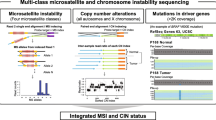Abstract
Background
During the multiyear progression to colorectal cancer, numerous genomic alterations arise in events ranging from single base mutations to gains or losses of entire chromosomes. A single genetic change might not stand out as an independent predictor of outcome. The goal of this study was to determine if more comprehensive measurements of genomic instability provide clinically relevant prognostic information.
Methods
Our study included 65 sporadic colorectal cancer patients diagnosed from 1987 to 1991 with last follow-up ascertained in 2006. We estimated an overall tally of alterations using the genome-wide sampling technique of inter-(simple sequence repeat [SSR]) polymerase chain reaction (PCR), and evaluated its relationship with all-cause survival. We also extended and sensitized the Bethesda criteria for microsatellite instability (MSI), by analyzing 348 microsatellite markers instead of the normal five. We expanded the MSI categories into four levels: MSI stable (MSS), very low-level MSI, moderately low-level MSI, and classical high-level MSI.
Results
Tumors with genomic instability above the median value of 2.6% as measured by inter-SSR PCR, were associated with far greater risk of death compared to tumors with lower levels of genomic instability. Adverse outcome was most pronounced for patients presenting with stage 3 disease. A gradient of increased survival was observed across increasing MSI levels but did not reach statistical significance.
Conclusion
Our findings suggest genomic instabilities quantified by inter-SSR PCR and increased precision in MSI values may be clinically useful tools for estimating prognosis in colorectal cancer.


Similar content being viewed by others
References
Beerenwinkel N, Antal T, Dingli D, et al. Genetic progression and the waiting time to cancer. PLoS Comp Biol. 2007;3:2239–46.
Sjöblom T, Jones S, Wood LD, et al. The consensus coding sequences of human breast and colorectal cancers. Science. 2006;314:268–74.
Stoler DL, Chen N, Basik M, et al. The onset and extent of genomic instability in sporadic colorectal tumor progression. Proc Natl Acad Sci USA. 1999;96:15121–6.
Stephens PJ, McBride DJ, Lin ML, et al. Complex landscapes of somatic rearrangement in human breast cancer genomes. Nature. 2009;462:1005–10.
Greenman C, Stephens P, Smith R, et al. Patterns of somatic mutation in human cancer genomes. Nature. 2007;446:153–8.
Sugarbaker DJ, Richards WG, Gordon GJ, et al. Transcriptome sequencing of malignant pleural mesothelioma tumors. Proc Natl Acad Sci USA. 2008;105:3521–6.
Benatti P, Gafà R, Barana D, et al. Microsatellite instability and colorectal cancer prognosis. Clin Cancer Res. 2005;11:8332–40.
Sinicrope FA, Rego RL, Halling KC, et al. Prognostic impact of microsatellite instability and DNA ploidy in human colon carcinoma patients. Gastroenterology. 2006;131:729–37.
Umar A, Boland CR, Terdiman JP, et al. Revised Bethesda guidelines for hereditary nonpolyposis colorectal cancer (Lynch syndrome) and microsatellite instability. J Natl Cancer Inst. 2004;96:261–8.
Poulogiannis G, Ichimura K, Hamoudi RA, et al. Prognostic relevance of DNA copy number changes in colorectal cancer. J Pathol. 2009;220:338–47.
Zhang Y, Martens JWM, Yu JX, et al. Copy number alterations that predict metastatic capability of human breast cancer. Cancer Res. 2009;69:3795–801.
Pretorius ME, Waehre H, Abeler VM, et al. Large scale genomic instability as an additive prognostic marker in early prostate cancer. Cell Oncol. 2009;31:251–9.
Anderson GR, Brenner BM, Swede H, et al. Intrachromosomal genomic instability in human sporadic colorectal cancer measured by genome-wide allelotyping and inter-(simple sequence repeat) PCR. Cancer Res. 2001;61:8274–83.
Jones BA, Christensen AR, Wise Sr, JP, Yu H. Glutathione S-transferase polymorphisms and survival in African-American and white colorectal cancer patients. Cancer Epidemiol. 2009;33:249–56.
Basik M, Stoler DL, Kontzoglou KC, Rodriguez-Bigas MA, Petrelli NJ, Anderson GR. Genomic instability in sporadic colorectal cancer quantitated by inter-(simple sequence repeat) PCR analysis. Genes Chromosomes Cancer. 1997;18:19–29.
Laiho P, Launonen V, Lahermo P, et al. Low-level microsatellite instability in most colorectal carcinomas. Cancer Res. 2002;62:1166–70.
Markowitz S, Wang J, Myeroff L, et al. Inactivation of the type II TGF-β receptor in colon cancer cells with microsatellite instability. Science. 1995;268:1276–7.
Vikki S, Launonen V, Karhu A, Sistonen P, Vastrik I, Aaltonen LA. Screening for microsatellite instability target genes in colorectal cancers. J Med Genet. 2002;39:785–9.
Valeri N, Gasparini P, Fabbri M, et al. Modulation of mismatch repair and genomic stability by miR-155. Proc Natl Acad Sci USA. 2010;107:6982–7.
Acknowledgment
This work was supported by NCI grants R01CA74127 to GRA and P30-CA16056 to the Roswell Park Cancer Institute; by the NCI SEER program contract (N01-PC-35133) and Rapid Response Surveillance Study amendment (HS, 2003) with the Connecticut Tumor Registry in the Connecticut Department of Public Health (DPH); and by the Patrick and Catherine Weldon Donaghue Medial Research Foundation (DF#01-025) and the NCI Program Project Grant (5-P01-CA42101) to BAJ. Certain data used in this publication were obtained from the Connecticut DPH, and the authors assume full responsibility for analyses and interpretation of these data. We thank Nicholas Petrelli for valuable conversations and his role in supplying the specimens, Janet Winston for the pathological examinations, and Roy Heinaman for expert technical assistance. We thank Daniel Rosenberg and staff for microdissection and DNA extraction of the Connecticut subset of tissues.
Author information
Authors and Affiliations
Corresponding author
Rights and permissions
About this article
Cite this article
Brenner, B.M., Swede, H., Jones, B.A. et al. Genomic Instability Measured by Inter-(Simple Sequence Repeat) PCR and High-Resolution Microsatellite Instability are Prognostic of Colorectal Carcinoma Survival After Surgical Resection. Ann Surg Oncol 19, 344–350 (2012). https://doi.org/10.1245/s10434-011-1708-1
Received:
Published:
Issue Date:
DOI: https://doi.org/10.1245/s10434-011-1708-1




